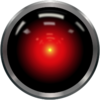Artificial intelligence (nonfiction): Difference between revisions
| Line 66: | Line 66: | ||
<div style="clear:both;"></div> | <div style="clear:both;"></div> | ||
[[File:In-Five-Years Ruben-Bollling.png]] | [[File:In-Five-Years Ruben-Bollling.png]] | ||
== Nonfiction cross-reference == | == Nonfiction cross-reference == | ||
Revision as of 11:36, 6 June 2016
Artificial intelligence (AI) is intelligence exhibited by machines.
Description
It is also the name of the academic field of study which studies how to create computers and computer software that are capable of intelligent behavior.
Major AI researchers and textbooks define this field as "the study and design of intelligent agents", in which an intelligent agent is a system that perceives its environment and takes actions that maximize its chances of success.
John McCarthy, who coined the term in 1955, defines it as "the science and engineering of making intelligent machines".
AI research is highly technical and specialized, and is deeply divided into subfields that often fail to communicate with each other.
Some of the division is due to social and cultural factors: subfields have grown up around particular institutions and the work of individual researchers.
AI research is also divided by several technical issues.
Some subfields focus on the solution of specific problems. Others focus on one of several possible approaches or on the use of a particular tool or towards the accomplishment of particular applications.
Central problems
The central problems (or goals) of AI research include:
- Automated reasoning
- Knowledge
- Planning
- Learning
- Problem solving
- Natural language processing (communication)
- Perception
- The ability to move and manipulate objects
General intelligence is still among the field's long-term goals.
Approaches
Currently popular approaches include:
- Statistical methods
- Computational intelligence
- Symbolic AI
Tools
There are a large number of tools used in AI, including:
- Search and mathematical optimization
- Logic methods based on probability and economics
Interdisciplinary
The AI field is interdisciplinary, in which a number of sciences and professions converge, such as computer science and Mathematics (nonfiction), along with psychology, linguistics, philosophy, neuroscience, artificial psychology, among others.
The study of artificial intelligence was founded on the claim that a central property of humans, intelligence -- the sapience of Homo sapiens -- "can be so precisely described that a machine can be made to simulate it."
This raises philosophical issues about the nature of the mind and the ethics of creating artificial beings endowed with human-like intelligence -- issues which have been addressed by myth, fiction and philosophy since antiquity.
Ethical concerns

Artificial intelligence has been the subject of tremendous optimism.
- But AI has also suffered stunning setbacks.
Artificial intelligence has been the subject of fear (see, for example: HAL 9000, Y2K, The Matrix).
- But these fears are not matched by actual experience.
Nonfiction cross-reference
- Computer science (nonfiction)
- Problem solving (nonfiction)
- Three is the Color of My True Love's Hair (nonfiction)
Fiction cross-reference
- Catch phrase - a predatory (nonfiction) artificial intelligence
- Gnomon algorithm
- Karl Jones
- Mathematics
- Napolean Bonaparte
- Three is the Color of My True Love's Hair
- Three is the Color of My True Love's Hair (analysis)
External links
General
- Artificial intelligence @ Wikipedia
- Artificial intelligence @ Wikipedia


